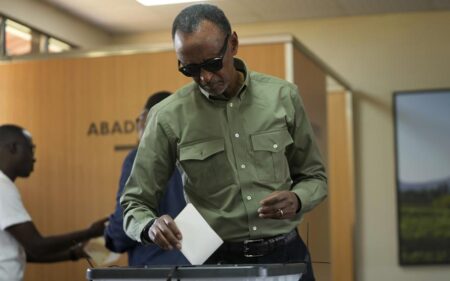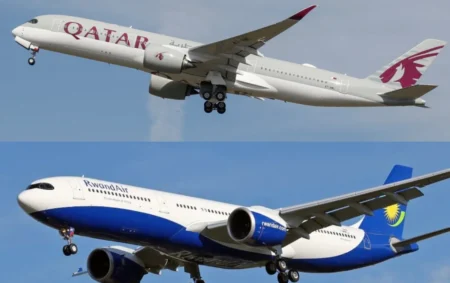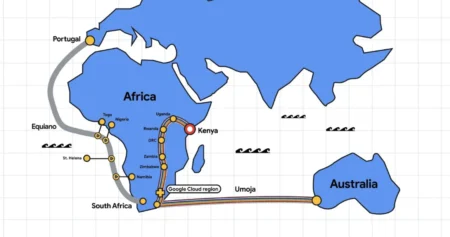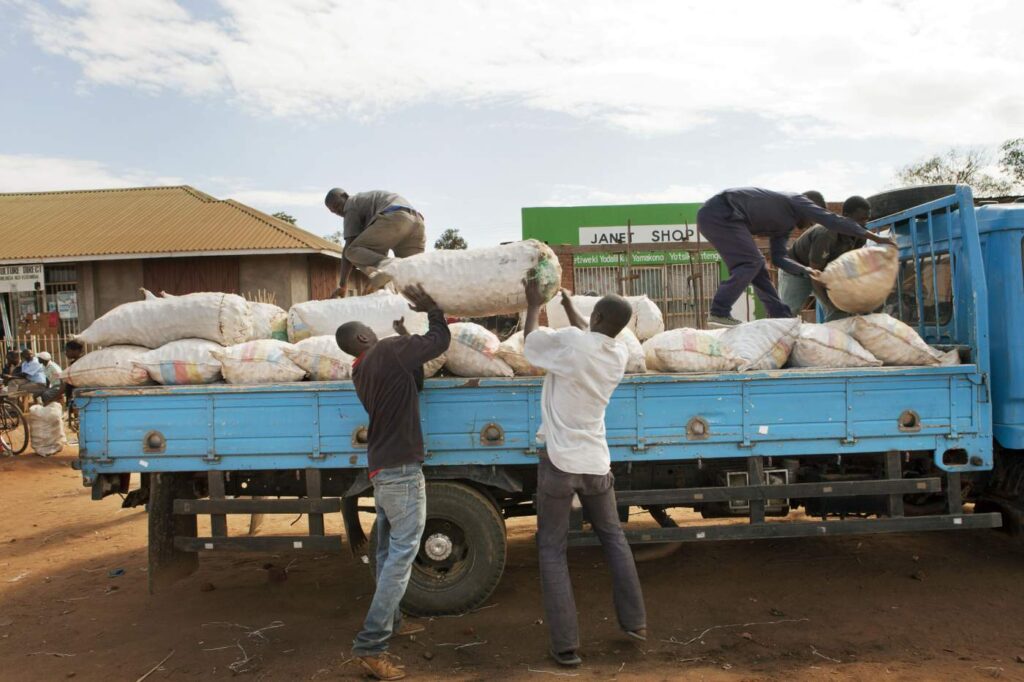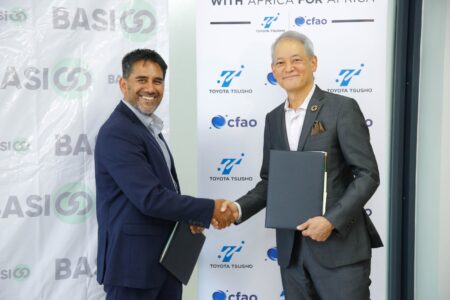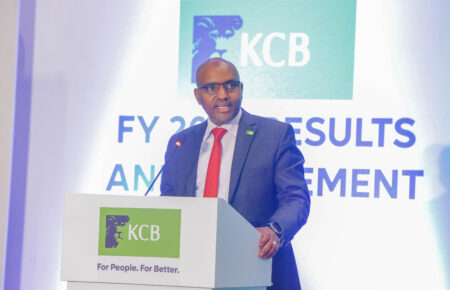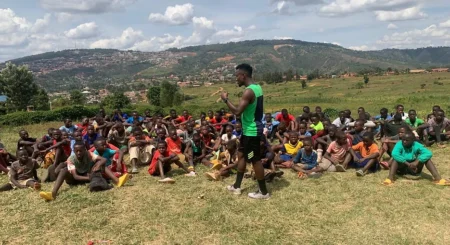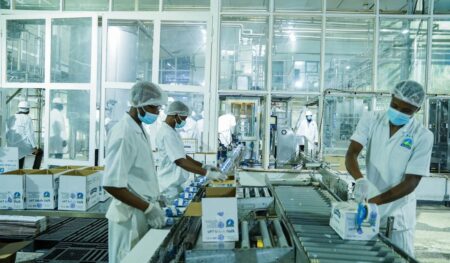- Africa’s new dawn: the rising role of digital and AI in agriculture
- Can Dangote Refinery Transform Africa Energy Ambition
- Gallup Survey: 80 per cent of Kenyan Workers Are Disengaged and Seek New Opportunities
- Madagascar Man Freed from 5KG Tumor After 15-Year Struggle
- How women in Africa are perceived and treated
- Sugar consumption in Kenya to Increase to 1.23 Million Tonnes
- Can Somalia and Turkey Oil deal Bring Change in Somaliland
- Remittances to Kenya dropped to $371.6 million in June, marking a six month low
Browsing: Rwanda
- Results show that long-serving Paul Kagame has floored his challengers, garnering 99% of the presidential vote.
- This move gives Kagame a new 7-year term, and another chance to solve the persistent Rwanda-DRC conflict.
- Rwanda-DRC conflict has evolved into one of the world’s worst humanitarian crises in the world.
Rwanda Elections
Early results show that President Paul Kagame has beaten his challengers, garnering a jaw dropping 99.1 percent of the presidential votes cast on Monday, July 15, 2024. Kagame, who has been at the helm of Rwanda’s governance since 1994 secured victory by a similar margin in 2017.
His main challengers Democratic Green Party’s Frank Habineza and independent Philippe Mpayimana got 0.53 percent and 0.32 percent of the vote respectively.
According to Rwanda’s National Electoral Commission, about nine million people out of a population of 14 million were registered to vote. This represents an increase of two million voters compared to …
- The UAE, Saudi Arabia, and Qatar, have poured billions into developing airports, airlines, and seaports across Eastern Africa in the last 10 years.
- In the latest development, UAE’s Sharjah Chamber of Commerce and Industry is set to build a new international airport just outside Kidepo National Park, in Uganda.
- These investments are transforming the region into a pivotal stopping ground for global trade, tourism, and travel.
The economic ties between the Gulf Cooperation Council (GCC) countries and Eastern Africa have deepened significantly over the past 10 years, driven by strategic investments in key infrastructure.
The Gulf nations, notably the United Arab Emirates (UAE), Saudi Arabia, and Qatar, have poured billions into developing airports, airlines, and seaports across Eastern Africa.
These investments are transforming the region into a pivotal stopping ground for global trade and travel, enhancing connectivity, and fostering economic growth.
Eastern Africa airports and airlines enhancing connectivity
The UAE …
- Google is rolling out Umoja cable, the first-ever fibre optic link directly connecting Africa with Australia, aiming to enhance global digital infrastructure and foster economic growth.
- The Umoja project, developed in collaboration with Liquid Technologies, will improve connectivity and drive digital inclusion across Africa.
- This initiative is part of Google’s long-term commitment to Africa’s digital transformation, with investments in infrastructure, cybersecurity, and AI innovation to support growth.
In a deal set to revolutionize digital connectivity across continents, tech heavyweight Google has announced the launch of Umoja, the first-ever fibre optic link directly connecting Africa with Australia. This project is poised to enhance global digital infrastructure, foster economic growth, and drive digital inclusion on a new level scale.
The Umoja cable, anchored in Kenya, will traverse a diverse array of African countries, including Uganda, Rwanda, the Democratic Republic of Congo, Zambia, Zimbabwe, and South Africa, before crossing the Indian Ocean …
- Under a new COMESA programme, farmers in the five East African countries are expected to access quality seeds, and training on how to improve production and distribution.
- The five-year programme is expected to help the countries cut post-harvest losses in horticulture to 40 per cent or lower, from highs of 60 per cent, for instance in Kenya.
- Agriculture is estimated to contribute on average 27% of the gross domestic product (GDP) in the EAC and accounts for the highest share of employment not only in the region but across Africa.
Agriculture is the backbone of nearly all East Africa region’s economies and the main economic activity for more than 70 per cent of the population. It is estimated to contribute on average 27 per cent of the gross domestic product (GDP) in the EAC and accounts for the highest share of employment not only in the region, but the African.…
- The momentum of financial inclusion programmes is progressively strengthened as financial institutions, businesses and consumers embrace cashless convenience and digital payments that are secure and seamless.
- Currently, Rwanda is a prime market for digital payments, with a young population of which 69 per cent is below the age of 30, and the second-highest population density in Africa
The momentum of financial inclusion programmes is progressively strengthened as financial institutions, businesses and consumers embrace cashless convenience and digital payments that are secure and seamless. Technology development broadens the scope of delivery of financial services, and the advantages of digital payments manifest in providing easy access to the masses, reducing travel and queuing times, quicker transactions and seamless money movements that are cashless.
Currently, Rwanda is a prime market for digital payments, with a young population of which 69 per cent is below the age of 30, and the second-highest population density …
detroit lions jersey
OSU Jerseys
asu football jersey
custom football jerseys
custom football jerseys
ohio state jersey
fsu football jersey
ohio state jersey
micah parsons jersey
ohio state jersey
custom made football jerseys
Florida state seminars jerseys
asu football jersey
Ohio State Team Jersey
- Electric bus company, BasiGo has secured $3 million (Sh396 million) worth of equity funding from CFAO Group to scale up electric bus production in East Africa.
- The investment, split between CFAO Kenya and Mobility54, will help accelerate the scale-up of BasiGo’s manufacturing and delivery of electric buses in Kenya and Rwanda.
- CFAO Group is building e-mobility ecosystem in East Africa by investing in green mobility startups through Mobility54.
Electric bus company, BasiGo has secured $3 million (Sh396 million) worth of equity funding from CFAO Group to scale up electric bus production in East Africa. The investment, split between CFAO Kenya and Mobility54, the …
- Tanzania and Rwanda are warming up to set up second official border post.
- Currently, Rwanda is the third largest user of Dar es Salaam port.
- More than 80% of Rwanda’s cargo goes through the port of Dar es Salaam.
The push to foster EAC integration appears to be moving in a positive direction with Tanzania and Rwanda taking steps to enhance one of East Africa Community (EAC) pivotal goal, regional trade.
A top Tanzanian envoy has announced plans to open a new border post with Rwanda, as part of ongoing measures between the two countries to scale up the movement of labour, goods and services providers.
Tanzania’s Minister of Foreign Affairs and East African Cooperation, January Makamba, made the announcement at the end of his four-day state visit to Rwanda.
The Minister revealed that the proposed border crossing will be set up in Tanzania’s Kyerwa district in Kagera Region and …
- East Africa’s banking giant KCB Group reports heightened operational expenses, which surged to $627 million in 2023, up from $447.9 million in 2022.
- The costs are associated with the consolidation of its subsidiary in the Democratic Republic of Congo, Trust Merchant Bank (TMB),
- Additional expenditures were related to a voluntary retirement scheme as well as litigation fees.
KCB Group, one of East Africa’s banking giants, has reported a net profit decline to $282 million for the year ending December 2023, from $307 million in 2022.
The bank has attributed this decline to increased operational costs and higher provisions for bad loans as primary reasons for the downturn in profitability.
In a period marked by economic challenges and strategic expansions, KCB Group faced heightened operational expenses, which surged to $627 million in 2023, up from $447.9 million in 2022.
DRC-based Trust Merchant Bank consolidation costs
This increase was largely due to …
- Kigali-based Future Light Football Academy offers more than just a chance to excel in sports; it provides youth with a lifeline away from the dangers of life on the street and back to school and family life.
- To further drive their reach, impact, and sustainable growth in Rwanda, the sports academy is seeking partners from sports clubs to corporate organizations.
- Founded by Bram Vlaanderen, a Dutch lawyer based in Dubai with a big heart for Rwanda, and Eric Iracyadukunda, a Rwandese professional football player, the academy has the potential to turn into a center of excellence for youth development.
In the city of Kigali, Rwanda, amidst the towering skyscrapers and bustling streets, lies a beacon of hope and opportunity for the youth. Future Light Football Academy, a burgeoning center of sports excellence, stands as a testament to the power of dreams and determination.
Founded by Bram Vlaanderen, a Dutch …
- Rwanda’s dairy sector produced one billion liters of milk in 2023 but remains a distance from industry leader Kenya.
- IFAD will fund a $100.37 million project for the second phase of Rwanda’s dairy milk development project.
- The Rwanda Dairy Development Project aims to reach 53 per cent of Rwanda’s dairy households and create 3,400 new jobs.
Authorities in Kigali are working to increase production in Rwandacustom stitched nfl jersey oregon football jerseys nike air jordan 1 elevate low alpinestars caschi luvme human hair wigs sac eastpak latex hood keyvone lee jersey 8 ft kayak sit top kayak jock strap yeezy shoes under 1000 inflatable kayak custom stitched nfl jersey brock purdy jersey ‘s dairy sector, a move that looks poised to see the country challenge the dominance of its East African neighbors, Kenya and Tanzania.
Through the Rwanda Dairy Development Project (RDDP), Kigali is set to roll out initiatives …





